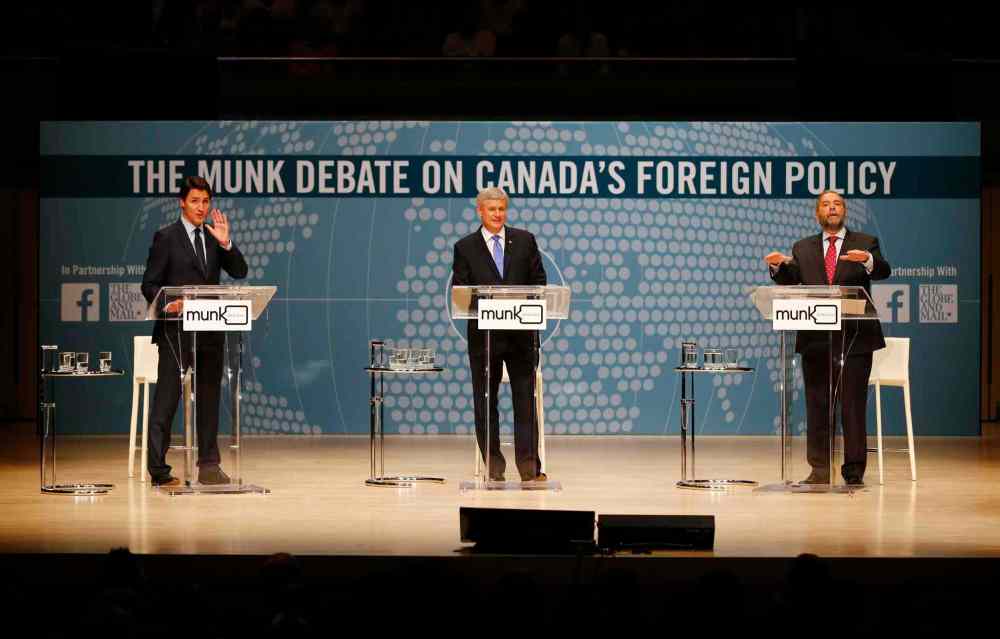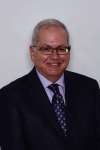Emerging world order eludes leaders
Debate reduced critical issues to knocks worth little more than chortles
Advertisement
Read this article for free:
or
Already have an account? Log in here »
To continue reading, please subscribe:
Monthly Digital Subscription
$1 per week for 24 weeks*
- Enjoy unlimited reading on winnipegfreepress.com
- Read the E-Edition, our digital replica newspaper
- Access News Break, our award-winning app
- Play interactive puzzles
*Billed as $4.00 plus GST every four weeks. After 24 weeks, price increases to the regular rate of $19.00 plus GST every four weeks. Offer available to new and qualified returning subscribers only. Cancel any time.
Monthly Digital Subscription
$4.75/week*
- Enjoy unlimited reading on winnipegfreepress.com
- Read the E-Edition, our digital replica newspaper
- Access News Break, our award-winning app
- Play interactive puzzles
*Billed as $19 plus GST every four weeks. Cancel any time.
To continue reading, please subscribe:
Add Free Press access to your Brandon Sun subscription for only an additional
$1 for the first 4 weeks*
*Your next subscription payment will increase by $1.00 and you will be charged $16.99 plus GST for four weeks. After four weeks, your payment will increase to $23.99 plus GST every four weeks.
Read unlimited articles for free today:
or
Already have an account? Log in here »
Hey there, time traveller!
This article was published 30/09/2015 (3672 days ago), so information in it may no longer be current.
Monday’s Munk debate on foreign policy testified, as much as anything else, to just how election campaigns and media reporting of them drain the substance from issues and debates. The leaders competed to reduce major international issues — the Islamic State, relations with the U.S., the Trans-Pacific Partnership Agreement — to a consistency guaranteed only to magnify their minor differences. They sought to make them sound as homey, familiar and domestic as possible: the Syrian crisis was transformed into something to be understood in terms of past waves of Irish immigration, the TPP in terms of the woes of the dairy industry.
Debate highlights were not serious debating points about the increasingly unfamiliar international environment that faces Canada but jibes worth little more than a short laugh. And the media’s verdict on this rather disappointing debate Tuesday morning? “Lively,” even “bloody great” and all about “Canadian values.”
The real story lay, in fact, in what else we read Tuesday morning. Rather than this alleged capstone of election debates, the leading story in major national papers was the UN General Assembly meeting hours before the party leaders stepped onto Roy Thomson Hall’s stage, the clashing views of presidents Barack Obama and Vladimir Putin at it and the increasing certainty the U.S. will have to come to some terms with Russia over its failing strategy in Syria.

Along with the U.S.’s and the West’s failures in Ukraine, where the rebels have been able to impose a ceasefire on the Poroshenko government scarcely reported in the mainstream Canadian press, Tuesday’s leading story pointed to just how dangerously distant Harper’s hubristic foreign policy is from today’s international realities. It also revealed how reluctant the other two party leaders, otherwise so eager to unseat Mr. Harper, were to shorten it and lay the foundation for the major task of redefining Canadian foreign policy that will face whatever government takes power after Oct. 19.
At no time since in the postwar period has a reconsideration of Canada’s foreign policy trajectory been more pressing. It is not only that the swelling ranks of “ABC” — anyone but Conservatives — voters behind the Liberals and the NDP are animated in good part by opposition to a decade-long run of Harper’s toxic foreign policy of counterproductive and futile rhetorical aggression and increased military deployment in futile missions that is painting a picture of Canada abroad few of them recognize. They are.
Nor is it simply that the longer-run trajectory of Canadian foreign policy — premised as it was on an understanding of the world order as U.S.-centred and economically liberal — is increasingly at war with new developments. It is.
Even more importantly, strong economic and political undertows are transforming the world order as we speak, making it more multipolar, less economically liberal, more state-centric and considerably less U.S.-centred. If the Munk debate was anything to go by, our leaders do not seem even dimly aware of it.
Geopolitically, the U.S.’s storied military power has been failing to prevail in key hot spots around the world, requiring it to come to terms with Russia over Syria and Ukraine, and with Iran, one-time “axis of evil” member, over nuclear power. Given that the U.S.’s beneficent influence on world affairs, always questionable, has become even more glaringly so since George Bush Jr. launched the still ongoing “war on terrorism,” it is imperative and urgent that rather than playing with cardboard cut-out understandings of other countries and leaders that are dangerously escalating the possibilities of destructive war, Canada and its western allies appreciate new realities and explore the new possibilities for peace multipolarity is also creating.
That is the role Canadians would expect Canada to explore. Indeed, another story in Tuesday’s paper was a Canadian government document warning of Canada’s waning influence at the UN and other international forums thanks to the unilateralism of the Harper years.
As for the world economy, hopes for strong U.S. growth have been repeatedly dashed. Europe remains mired in multiple crises of its own. In this context, while mutually beneficial trade agreements are undoubtedly necessary, those, such as the TPP, which are designed to marginalize the most important economy in the world, China’s, need to be understood and dealt with as such, not reduced to a question of supply management of Canada’s dairy industry as it was in the debate. More broadly, the relevance of globalization understandings of the world economy are increasingly questionable. A structural slowdown in world trade is occurring. The collapse of capital flows after 2008 has been followed only by a weak revival.
Both these developments are actually more hopeful than might appear at first glance. As more and more non-western countries wise up about laying their markets unilaterally open to trade, every country’s domestic markets become more important and they, in turn, require growth to rely more in raising and equalizing domestic incomes rather than imagining exports based on low domestic wages can drive growth.
This is as hopeful for Canada as it is for Cameroon, but that hope is yet to spring in our party leaders’ hearts. The collapse of volatile capital flows has been accompanied by an increase in productive and long-term ones, including through initiatives taken by the BRICs (Brazil, Russia, India and China) in setting up their New Development Banks and China in setting up the even more massive Asian Infrastructure Investment Bank. This, too, contains possibilities for solid growth for richer as well as poorer countries.
The Munk debate was a lost opportunity for considering the real dangers and exploring the equally real possibilities for peace the multipolar world brings. It is high time Canada’s leaders step down from the increasingly wobbly pedestal of western hubris. Only then will they see both the dangers and the possibilities — and Canadians want them to.
Radhika Desai is a political studies professor and the director of the Geopolitical Economy Research Group at the University of Manitoba.
History
Updated on Wednesday, September 30, 2015 7:37 AM CDT: Replaces photo













